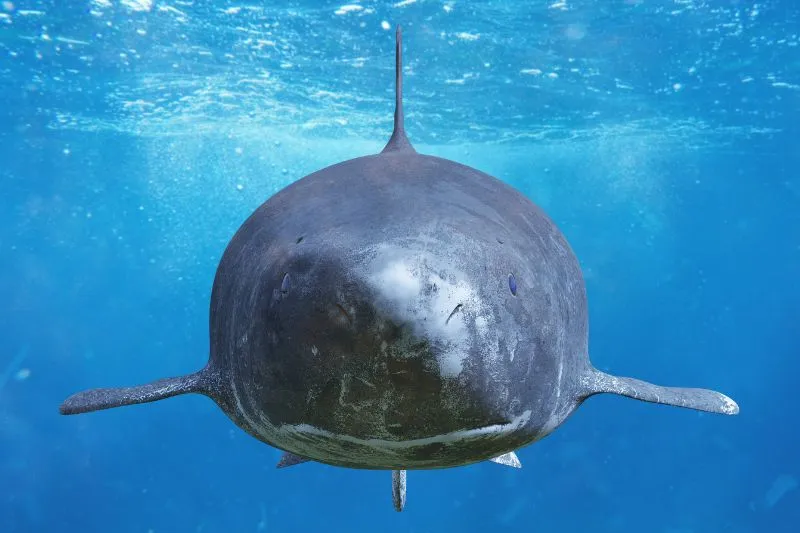Greenland sharks are the longest-living vertebrates swimming around the freezing Arctic waters. But why do they live so long when inhabiting one of the most extreme environments on the planet?
Greenland Sharks have an average lifespan of 272 years but scientists think they could live to 500 years old. They reach such an old age due to having a low metabolism, an adaptation to the deep and cold polar waters where they live. They maintain this low metabolism by moving very slowly, with a maximum speed of just 2.9 km/h (1.8 mph).
Keep reading to find out more about how old and big Greenland sharks get, and how they can be aged, if at all.
How Long Do Greenland Sharks Live?
In 2016 a newly discovered age of 392 years, (± 120 years), was recorded for the Greenland shark. They grow very slowly and reach sexual maturity at the late age of around 150 years1 (sources: S. Augustine, et al, Polar Biology Vol. 40, 2017, pp. 2429–2433 and J. Nielsen, et al, Science, Vol. 353, Issue. 6300, 2016, pp. 702-704).
Why Do Greenland Sharks Live So Long?
If there is one thing we can learn from Greenland sharks it is that the key to long life is to take things slow.
The temperatures of the surrounding environment impacts the energy demand of an animal which can have a knock on effect to things like longevity and age of maturity.
Greenland sharks live in very harsh conditions, much colder than the waters of other shark species such as great whites and bull sharks. Greenland sharks can live in waters of -1.8°C and at abyssal depths greater than 1200 m. They were even recorded down to 2 200m depth2 (sources: E. Ste-Marie, Scientific Reports, Vol. 10, Article No.19297, 2020 and M. A. MacNeil, Journal of Fish Biology, Vol. 80, Issue 5, 2012, pp. 991-1018).
One of the ways they have adapted to these colder temperatures is by burning energy much slower, this is known as having a low metabolism.
Their ‘slow life’ is a key part of having a low metabolism. Their maximum speed recorded is under 2.9 km/h (1.8 mph) which sounds like they almost don’t put any effort into moving. However, this seems to be very important when it comes to being alive for hundreds of years3 (source: E. Ste-Marie, et al, Journal of Experimental Biology, Vol. 225(7), 2022).
How Big Can a Greenland Shark Get During it’s Lifetime?
Greenland sharks grow bigger over time and can reach lengths of up to 6.4m (20 ft). However, most often they are between 3 and 5 m (9-16 ft) long.
To complete the picture of how giant Greenland sharks can be we will tell you they have been recorded weighing over 1 ton (1023kg). Not surprising that they are the biggest fish found in the Arctic waters4 (source: Adiv A.Johnson, et al, Ageing Research Reviews, Vol. 55, 2019, No. 100947).
Greenland sharks have a diverse diet, but it is important for them to eat food that provides a lot of energy.
For example, seals and beluga whales are pretty good meal option since they are a rich source of energy due to being large, in comparison to fish, and have a thick layer of blubber fat. When Greenland sharks feed on such high-energy prey, they can survive for few months without eating5 (source: Frontiers in Marine Science, Advancing Research for the Management of Long-Lived Species: A Case Study on the Greenland Shark).
How Do You Know How Old Greenland Sharks Are?
In most shark species age can be determined by counting the growth bands on their vertebrae (back spine) or fin spines, just like on trees.
However, Greenland sharks don’t have fin spines or hard tissues in their bodies and their vertebrae are too soft to create growth bands like other sharks do.
Scientists are able to tell how old a Greenland Shark is due to proteins that are developed in the shark’s eyes while it’s still an embryo. This protein does not degenerate with time, and it acts just like well-preserved fossil. Scientists use carbon dating of these proteins found in the eye lenses of Greenland sharks to determine their age.
However, this method is only giving estimates and more work is needed to be improved so more precise measurements are taken6 (source: J. Nielsen, et al, Science, Vol. 353, Issue. 6300, 2016, pp. 702-704).
How Does The Greenland Shark Survive?
Greenland Sharks grow slow, age slow and have very dull movements which allows them to maintain slow metabolism.
Low metabolic rate can be interpreted as an adaptation of Greenland sharks to survive the cold of the Arctic seas7 (source: E. Ste-Marie, et al, Journal of Experimental Biology, Vol. 225(7), 2022).
Greenland sharks are apex predators and are on the top of the Arctic food chain. Moreover, long-lived species generally encounter minimal predation. However, the biggest threat they are facing is bycatch from fisheries using trawl, longline and gillnet. Sadly, the IUCN reported a decline in their populations in 2019 when the last assessment was done8 (source: IUCN).
What Is The Oldest Living Greenland Shark?
The oldest Greenland shark examined by scientists was estimated to be at age of around 400 years.
However, using carbon dating of shark’s eye lenses scientists can only give estimates and not definite age. Although, even with average age of 272 years, Greenland sharks are still the longest-lived vertebrate9 (source: J. Nielsen, et al, Science, Vol. 353, Issue. 6300, 2016, pp. 702-704).
Related Questions
When Did The Greenland Shark Evolve?
Greenland sharks evolved 2.34 million years ago from the sleeper shark. This happened because groups of sharks became separated by changing sea levels during the ice age causing them to evolve differently10 (source: Ryan P. Walter, et al, Ecol Evol, 2017, Vol. 7(19), pp. 8113–8125).
Can a Greenland Shark Live to 500?
Yes, Greenland sharks can live up to 500 years. The average lifespan is 272 years. However, scientists have recorded a female that was estimated to be between 272 and 512 years old11 (source: National Oceanic and Atmospheric Administration).


